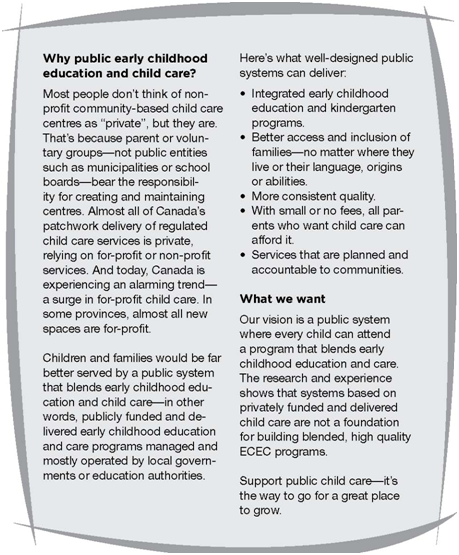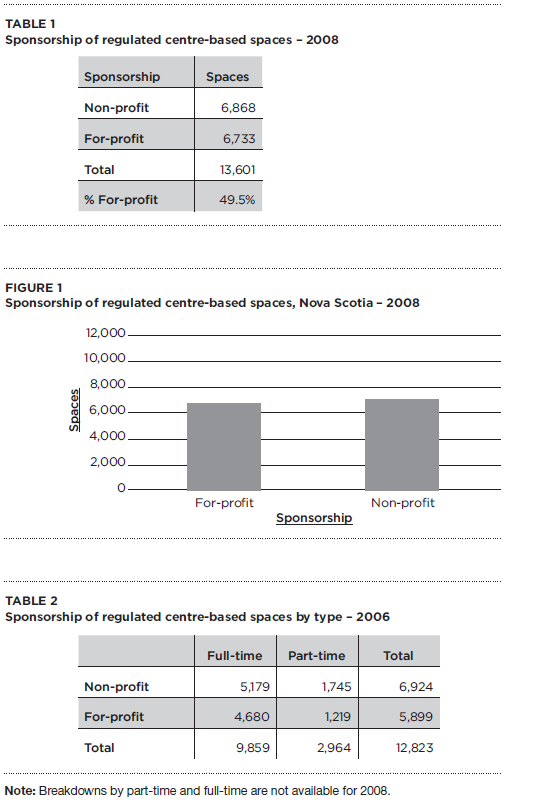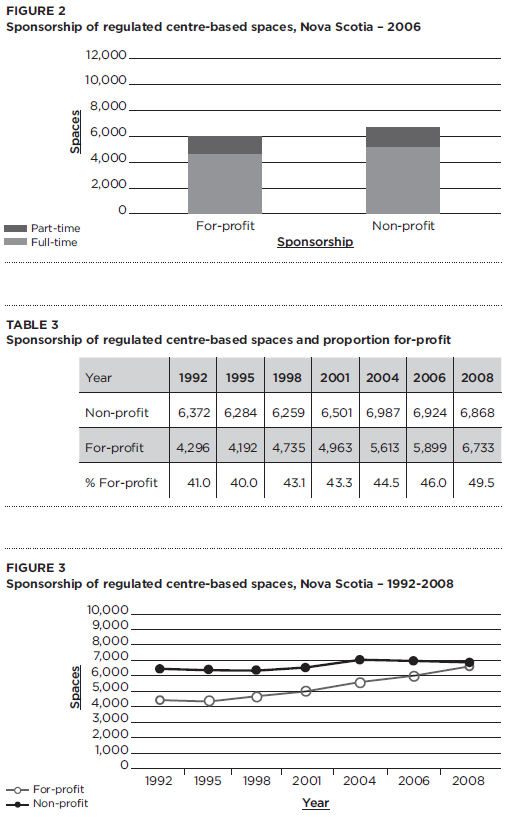Public child care and early childhood education
Nova Scotia has no publicly delivered child care and there is no legislated local government role in child care delivery, administration or funding. There is, however, one form of publicly delivered early childhood education. Kindergarten (“Grade Primary”) is compulsory and available to all five-year-olds for a full school-day (maximum four hours a day through Grade 2). A 19-site project piloting four-year-old kindergarten was launched in 2005 but cancelled in 2008.
Who provides child care?
Half of Nova Scotia’s child care spaces—49.5% in 2008—are now in the for-profit sector. In recent years, most new growth has been in the for-profit sector. Between 2006 and 2008, for-profit growth was more than 100%—834 for-profit spaces were added, while the non-profit sector lost 56 spaces.

Public funding
Child care funding in Nova Scotia stagnated between 1992 and 2001. Modest increases followed, with the biggest occurring between 2006 and 2008 (a $13 million annual increase).
Provincial policy has steadily shifted over the years in favour of the for-profit sector. Public funds were available only to the non-profit sector until 2000, when subsidies first became available to the for-profit sector. Operating and capital funds—a growing proportion of the provincial child care budget—also became available to the for-profit sector. By 2008, the for-profit sector could access all funds (subsidies, operating grants, and capital funding).
Subsidies account for 28% of public child care funding, capital grants and loans comprise 25%, and recurring funding makes up 44%.
Since 1995, there has been only a small increase in spaces and subsidized children, and no appreciable increase in subsidy eligibility levels.
![]()
![]()

Provincial funding policy
- Total provincial allocations for regulated child care (2007/2008): $37,150,418.
- The for-profit sector now has access to all the different types of public funding for child care—subsidies, operating grants and capital funding.
- Fee subsidies are paid directly to both for-profit and non-profit service providers on behalf of eligible families. The number of portable subsidies (assigned to the child and for use in any licensed centre) has been growing relative to fixed subsidies (attached to specific non-profit centres). Programs may charge subsidized parents above the subsidy rate.
- Nova Scotia is one of four provinces that offer capital dollars to the for-profit sector. (The others are New Brunswick, Alberta and British Columbia.) Capital grant program funding is available to for-profits and non-profits. Both sectors are also eligible for provincial government loans for expansion, renovation and repair, with for-profits receiving a smaller amount.
Of historical note
Before 2000
Only non-profit centres operated by community-based organizations and family child care agencies could enrol children receiving subsidies and receive operating grants.
2000
Portable subsidies were introduced. These are assigned to the child—not to the child care centre—and may be used in any eligible licensed full-day child care centre, non-profit or for-profit. All new subsidized spaces have been portable since 2000.
2003/2004
For-profit centres became eligible for some operating grants.
2008
Capital funding was made available to for-profits, and 389 fixed subsidy spaces were converted to portable subsidies. For-profit centres became eligible for all operating grants.
Relevant quality research
There are statistically significant differences in quality between for-profit and non-profit child care in the Atlantic provinces. The Atlantic Day Care Study (Lyon and Canning, 1995) found that non-profit centres consistently scored higher on the Early Childhood Environment Rating Scale (ECERS) than for-profit centres across all four Atlantic provinces. The findings were significant for all provinces. In Nova Scotia:
- The average ECERs score (non-profit and for-profit) was 4.84.
- The mean for the for-profit sample was 4.44; for the non-profit sample it was 5.15.
(In the ECERS, a score of 3=minimal, 5=good, and 7=excellent.)
Who’s who in the for-profit sector
The for-profit sector in Nova Scotia is made up of individual owner-operated centres and a number of local chains. In addition, two large national chains have recently opened locations in the province. Kids & Company, which has 24 locations nationally, opened in Halifax in April 2009 with plans to open a second location. Kinderville recently opened a location in Dartmouth. The chain has more than 20 centres in Québec, Ontario and the United Arab Emirates, and has announced plans to expand across Canada and overseas. Locations of interest in Nova Scotia include Halifax and Truro.
The for-profit sector is represented by the Private Licensed Administrators Association of Nova Scotia Child Care Centres. Its co-chairs are Heather Hansen-Dunbar, owner of Kids R Kids Daycare in Halifax, and Shane Richard, owner of the chain, Little Wonders Child Care Centres. See their testimony at the NS House of Assembly Committee on Community Services here: http://www.gov.ns.ca/legislature/hansard/comm/cs/cs_2008feb05.htm
Chains (multiple ownership in the for-profit sector)1
Larger chains (six or more locations)
Kids & Company Ltd.
Owners: Victoria Sopik and Jennifer Nashmi
One Nova Scotia location (Halifax),
24 locations nationally
Age range: 3 months – 12 years
2008 profit = $13,748,614
Website: www.kidsandcompany.ca
Kinderville Montessori Day Centre & PreSchool
Owner: Manishi Sagar
One Nova Scotia location (Dartmouth), part of a chain of over 20 centres in Québec, Ontario and the United Arab Emirates
Age range: 18 months – 12 years
2008 profit = $12,200,000
Website: www.kinderville.com
Note: In September 2007 Kinderville announced plans to add several new centres across Canada and overseas within the next 36 months. Locations of interest included Ottawa, Toronto, Oakville, Mississauga, London, Ontario, and in and around Halifax or Truro, Nova Scotia.
Smaller chains (five or fewer locations)
Adventurers Child Care Centres
Four locations (Two in Sackville, two in Dartmouth)
Age range: 3 months – 5 years
Apple Dumpling Day Care and After-School Care
Three locations (Waterville, Coldbrook and New Minas)
Age range: 18 months – 12 years
Duck Duck Goose Children’s Centre Ltd.
Owner: Krista and Carl Chapman
Three locations (Dartmouth)
Age range: 18 months – 12 years
Little Wonders Child Care Centre
Owner: Shane Richard
Three locations (Charlottetown, Truro and Bible Hill)
Age range: 18 months – 12 years
Reference
Lyon, M. and Canning, P. (1995).The Atlantic Day Care Study. Halifax: Mount Saint Vincent University.
Endnote
1 The content of this section was compiled using the best information that is publicly available. Using these sources, every effort has been made to ensure that the information is accurate and comprehensive. Ownership of two centres was not included as a “chain”.


